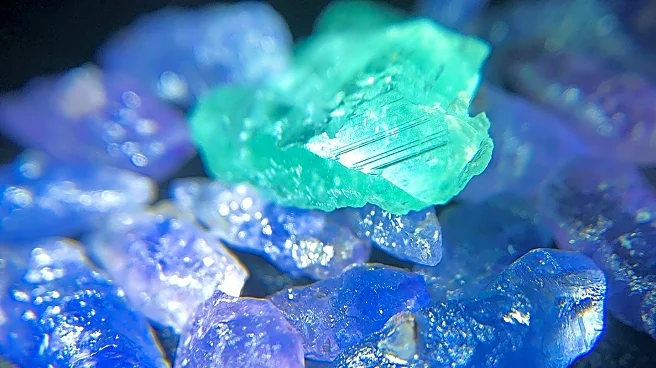What's Happening?
A recent study published in the Journal of the American Chemical Society has revealed that reptiles, such as snakes, excrete waste in a crystalline form, which could have significant implications for human
health. Researchers examined the solid urine of over 20 reptile species and found that these animals produce uric acid in tiny spheres, a method that allows them to conserve water. This discovery is particularly relevant as it may lead to new treatments for human conditions like kidney stones and gout, which are caused by uric acid buildup. The study, led by Jennifer Swift, highlights the unique adaptation of reptiles to safely store and remove waste, potentially offering insights into disease prevention and treatment for humans.
Why It's Important?
The findings from this study could have a profound impact on medical science, particularly in the treatment of conditions related to uric acid accumulation in humans. Kidney stones and gout are painful conditions that affect millions of people worldwide. Understanding how reptiles manage to excrete uric acid safely could inspire new therapeutic approaches, potentially leading to more effective treatments. The research underscores the importance of studying biological processes in other species to uncover solutions to human health problems. This could benefit pharmaceutical companies and healthcare providers by offering new avenues for drug development and treatment strategies.
What's Next?
Further research is needed to explore how the chemistry of reptile waste can be applied to human medicine. Scientists will likely conduct additional studies to understand the mechanisms behind the formation of uric acid crystals in reptiles and how these processes can be replicated or adapted for human use. Collaboration between biologists, chemists, and medical researchers will be crucial in translating these findings into practical medical applications. The study's support from institutions like the National Science Foundation and Georgetown University suggests that there is significant interest and potential for future breakthroughs in this area.
Beyond the Headlines
The study of reptile waste management not only opens up possibilities for medical advancements but also highlights the broader implications of biomimicry in science. By learning from nature, researchers can develop innovative solutions to complex problems, potentially leading to sustainable and efficient technologies. This approach could extend beyond medicine, influencing fields such as environmental science and engineering. The ethical considerations of using animal biology for human benefit will also need to be addressed, ensuring that such research is conducted responsibly and with respect for biodiversity.










